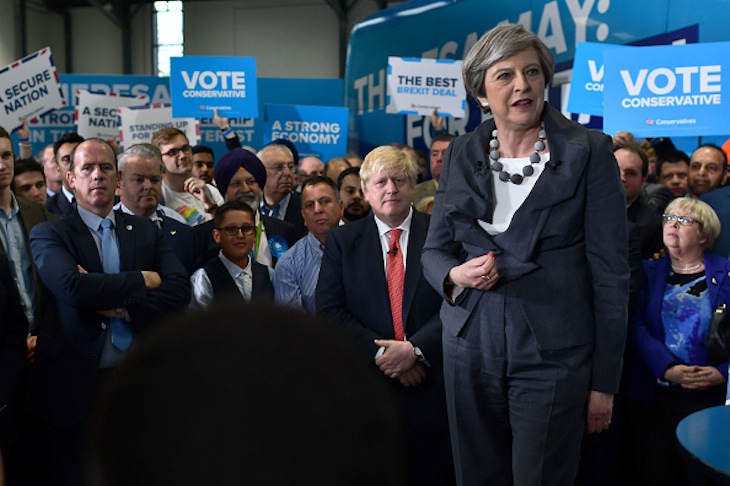There’s an expression used in football to describe an approach to the game that discounts the virtues of elegance, style, beauty, originality and daring, and — concentrates on blocking, frustrating and grinding down. It’s called ‘winning ugly’. While degrading the game, it often works.
But having won a match, a football team does not have to govern the country for five years. It does not need our love, our patience or our intellectual respect. The Conservative party attempted to win the general election by winning ugly, and in doing so, they have lost some of our love and our respect. That, I reflect, is what, without direction from the top, ‘professional’ modern campaigning risks achieving.
Could the Tories have had a more self-destructive campaign if they had simply blocked their ears to advice from the high priests of polling and political communications? It’s hard to think how.
Who would have thought that after a general election called in the confident hope of cementing a government’s and a party leader’s authority, we should end it with May losing her majority? At Westminster Theresa May’s colleagues, new and old, will now have seen her openly mocked by allies as well as enemies, her name jeered at by audiences who (contrary to CCHQ’s complaints) were picked for balance, but themselves caught the national mood of irritation with the Conservative campaign.
Like virginity, a reputation for acuity, if it takes a tumble, has gone. The parliamentary Conservative party is a merciless beast, and from now on she is on probation. Professional communications have had an important hand in achieving this sad fall.
I have nothing against systematic data-gathering or the conscious framing of a campaign or its messages if these things are intelligently done. My complaint against the communications industry, however, is that so often it isn’t any good at communicating. It ends up cackhandedly breaking the first law of successful magic, which is that your audience must not see the trick. It ends up communicating its own existence and blocking our view of the leaders and ideas it was supposed to showcase. People are not stupid. People distrust propaganda. They see it, and turn away in disgust.
I’m afraid journalists are rather in awe of the comms priesthood, feeling, as fellow cynics, almost complicit in their art. As the campaign kicked off, how many times did you read the winking advice from a political commentator that ‘if you’re already sick of reading about Mrs May’s “strong and stable leadership” and how this is a choice about who negotiates Brexit, Theresa May or Jeremy Corbyn, then it’s working’? Or even worse, the nudge-nudge suggestion that the mindless repetition of crude slogans isn’t aimed at people like you or me, but the poor old hoi polloi whose attention span for politics is rather limited?
Well, here’s news for the priesthood: the poor old hoi polloi noticed their intelligence was being insulted, and didn’t like it at all. I’ve fixed on my fence the big poster the Tories supplied, with the name of our excellent Conservative MP and then, in huge letters, ‘standing with Theresa May’. In the night, someone keeps defacing it with stick-on fly-posters. I pull them off, of course, but I’ve a sneaking sympathy for whoever’s doing this. When I stood for this constituency I was standing as myself and as the Conservative candidate. Everyone knew who our leader was; and they know today. The more noisily you keep plugging her name, the more people wonder why you feel the need to.
If before the campaign started you’d researched what people want from Mrs May, you’d have found that her potential supporters did indeed think her strong and stable — and they also thought her dignified, modest, understated and rather reserved. They liked that. In the East Midlands, where I live, they liked it very much. So to make her appear to have been bragging about her own strength and stability, while kicking Mr Corbyn in the shins with personal remarks, spoiled the picture it was supposed to paint. It has made her look edgy, defensive. Not taking part in TV debates was supposed to appear commanding: above the silly shouting match. It has ended up making her look frit.
The temptation is to blame Sir Lynton Crosby, the Tories’ chief consultant on this campaign. That would be a mistake. Politicians are usually hopeless at management, at running things. What they value in people like Sir Lynton is his ability to get a grip. You need a command structure. Somebody has to gather people in the office every morning and say: ‘This is what we’re doing today.’ Election campaigns are notorious for an excess of chiefs over Indians and nobody to bang heads together. By repute, Lynton does. He creates and manages the sales team.
But the product has to come from the very top. The leadership’s campaign team proposes, but the leadership disposes, or should. Mrs May should have been embarrassed to keep saying ‘strong and stable’ and embarrassed to order all her minions to do the same. She should have let it be known she wanted no personal abuse of Mr Corbyn, and no questioning of his motives, let alone his patriotism, but only a confident rebuttal of his ideas.
I hate to see the leader of my party — and the best hope Britain has of getting through the next five years — diminished. Leadership is not a construct but a flame. To delegate to tradesmen (for that is what the communications industry are) the flame itself was a kind of abdication. The flame is now dimmed.







Comments